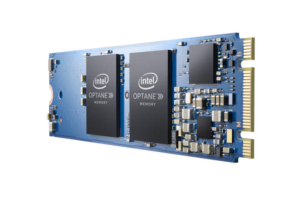
Startup MemVerge Combines Memory, Storage

A startup combining persistent memory and data storage has emerged from stealth mode with a platform running on chip maker Intel’s Optane architecture.
MemVerge claims to have invented what it calls “memory-converged infrastructure” that eliminates barriers between memory and storage. The platform, which is based on Intel’s Optane DC persistent memory, targets machine learning, data analytics and other data-intensive workloads.
Separately, the San Jose-based startup announced a $24.5 million funding round with participation by Gaorong Capital, Jerusalem Venture Partners, LDV Partners, Lightspeed Venture Partners and Northern Light Venture Capital.
The Optane-based platform is said to deliver a ten-fold boost in both memory size and data I/O performance, the startup said Tuesday (April 2). Among the early datacenter applications are faster training of AI models along with greater predictability in running other complex enterprise workloads.
Intel introduced its Optane DC—as in datacenter—persistent memory last year, billing it as a “new class of memory” for handling larger data sets closer to the processor as a way of reducing latency when fetching data from storage.
MemVerge is the latest data-crunching vendor to deploy Intel’s (NASDAQ: INTC) memory architecture as a way to reduce latency associated with the movement of large data volumes in and out of storage systems. The startup’s approach combines emerging persistent memory technology with maturing hyperconverged infrastructure.
MemVerge touts its memory-converged platform as simultaneously providing enterprises with a combination of higher capacity computing memory and faster storage. The combination overcomes the “two biggest bottlenecks in the processing of machine-generated data,” the startup said.
MemVerge’s proprietary “distributed memory objects” (DMO) scheme is designed to provide a “logical memory-storage convergence layer” running on the Optane DC platform. The approach targets workloads ranging from AI model training, analytics, the Internet of Things and data warehousing along with frameworks like Apache Spark and TensorFlow.
The shift to converged memory and storage is being driven by the demand of big data processing in which those workloads require storage with fast sequential and random access. Hence, the startup said its DMO technology can, for example, access the large number of small files generated while training AI models at speeds comparable to accessing a small batch of larger files. That approach would speed AI training and other machine learning workloads, MemVerge said.
The startup was founded by Charles Fan, formerly head of VMware’s (NYSE: VMW) storage unit, and Caltech Professor Shuki Bruck, co-founder of XtremIO and Rainfinity, along Caltech senior postdoctoral scholar Yue Li.
“The commercial availability of Intel’s Optane DC persistent memory allows the storage and memory functions to come together for the first time in the history of computing,” said Fan, who also serves as company CEO.
Meanwhile, the startup said it would use funds raised in its Series A funding round to advanced development of its memory-converged infrastructure architecture.
Recent items:
Aerospike Adds Intel’s Optane Persistent Memory
GridGain Adds Persistent Store to In-Memory Platform



























